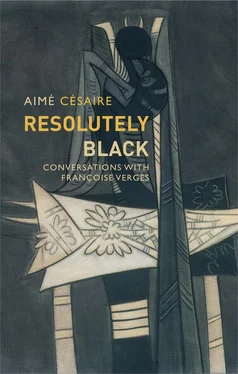In these 2004 interviews, Aimé Césaire only occasionally uses the term noir . His term, and one that is forever associated with his name, is nègre (the title of the French version of this book is “ Nègre je suis , nègre je resterai ”). Césaire wasn’t the first to reclaim this term, but he is perhaps responsible for elevating and popularizing its use at a time when both noir and homme de couleur were both available as relative terms of distinction. 2Rather than drawing on these mildly “accepted” terms, Césaire deliberately chose a more confrontational approach with the use of nègre , a word rejected by many at the time as offensive (the term remains pejorative today). Hence the name “Négritude,” a neologism created by Césaire, for the international movement he started with Léopold Sédar Senghor and Léon Gontran Damas, a movement whose goals were twofold: to contest racism and colonialism by cultural means; and to create a collective identity based on a set of shared cultural values and experiences. In Césaire’s hands, the term nègre is thus double-edged. On the one hand, the appropriation of this once pejorative term is used as a rallying cry; on the other, it is meant to serve as a stark reminder of slavery and colonialism.
In this respect, Césaire’s use of this term is not unlike his much-discussed stance on reparations, articulated here in these conversations with Françoise Vergès. Césaire feared reparations could offer France an easy way out of its dark past and troubled present. By paying its due, not only would France be free of guilt, but it would be easier for it to elude accusations of structural racism. Failing to acknowledge the weight of history, acts of racism could be falsely perceived as chance occurrences spontaneously produced by individual actors, rather than part of a deep-rooted historical phenomenon shaping French society on a more fundamental level. Césaire believed France could still be forced to own up to its past and provide aid to countries in need without succumbing to a fantasy of reconciliation. The past, however, would remain – and should remain – irreparable.
Once synonymous with “slave,” the term nègre prevents one from forgetting the irreparable damage caused by slavery and colonialism. Its range of meaning – from offensive slur to a self-affirming designator – knows no exact equivalent in English. Throughout the history of its use, it aligns with a different set of English terms depending on the period in question. Brent Hayes Edwards suggests that during the interwar period, when Césaire adopted the term, though its function was similar to the “n-word” in English, it was more closely aligned with “black,” which was also a derogatory term in the 1920s, whereas “Negro,” written with a capital N in the manner of W. E. B. Du Bois, corresponded at that time more to the French term Noir . Of course, these are all rough and fleeting correspondences that would continue to shift over the ensuing decades. For a while, nègre was most frequently translated as “negro”; now it isn’t uncommon to translate it as “black”. It goes without saying that neither of these can account for the historical shifts in its meaning.
Thus, any attempt to translate Césaire’s use of nègre in 2004 would remain approximate, if not misleading. For this reason, I have decided against seeking a single linguistic match for it. At times, I have left it untranslated when I believe it speaks for itself. At others, I offered what I felt was an appropriate translation for a given context while providing the original in square brackets. My hope is that this will allow the reader to gain a sense of the nuance and range of the term as used by Césaire while serving as a reminder of the plurality of black experience and of the history of slavery and colonialism.
Finally, it is worth mentioning that race and gender are often ignored when discussing a translator’s approach. This is unfortunate. As a translator who is both white and male, I am aware that my position affords me certain privileges just as it imposes certain limitations on the strategies I can choose from. Césaire’s writing has been deftly handled by a wide range of translators, many of whom are black or people of color, and their strategies are by necessity different from mine. I admire these translations and don’t see my approach in opposition to theirs. Nor do I think recognizing the race and gender of a translator should be seen as an apology or justification for the linguistic or stylistic choices made. Still, I believe it is important to acknowledge limits and to see them for what they are: an opportunity to recognize difference, to make a certain level of distance felt, rather than as an excuse to speak on the behalf of others. After all, as Césaire reminds us, the specificity of different cultures is often best seen in the gaps that hold them apart.
Matthew B. Smith
Unless otherwise noted, all translations are my own.
1 See Black France/France Noire. Edited by Tricia Keaton, T. Denean Sharpley-Whiting and Tyler Stovall (Duke University Press, 2012), p. 3. 2 Brent Hayes Edwards, The Practice of Diaspora: Literature, Translation and the Rise of Black Internationalism (Harvard University Press, 2003). For an enlightening discussion on translating the term “nègre,” see especially pp. 17–38. My understanding of the history of these terms is greatly indebted to Edwards’ work.
Preface By Françoise Vergès
It may surprise readers that in France, in the early 2000s, Aimé Césaire was barely known and read outside academic circles. To some, his name was synonymous with the French policy of assimilation, which translated into greater dependency and increased inequalities in the larger French Republic. This is due to the role he played in pushing through the law of departmentalization in 1946, which transformed former slave colonies into overseas departments at a time when colonized peoples were fighting for independence. Although I agree with critics of this law, I was nonetheless surprised that Césaire’s other works – his Discourse on Colonialism , his 1956 letter of resignation from the French Communist Party (a scathing critique of the French left’s indifference to race, which still resonates today), his biography of Toussaint Louverture, his speeches at the National Assembly, where he had always fought French racist and neocolonial policies – was forgotten. To me, Césaire remained a prominent figure of anticolonialism. He was also familiar to me on a more personal level. Both my paternal grandfather and my father worked closely with him, the former having fought with him to end the colonial status of Guadeloupe, Guiana, Martinique, and Réunion, and the latter in the 1970s to counter the French colonial policies that continued to reign in these lands. I had often seen him at political meetings in Paris but we were never close. Shocked by his increasing marginalization in France, I wrote him a letter in July 2004. I brought up his ties to my family and asked if I could interview him. Ten days later, I received a phone call from his assistant. She told me Césaire was surprised I wasn’t there yet, of course he was willing to talk to me, and, given his age, I should waste no time.
A few days later, I was on my way to Fort-de-France, Martinique. Over the course of several mornings, we met in his office where he had served as mayor for 56 years. This man, with whom I was talking for the first time on a one-to-one basis, was extremely gracious, at once attentive and aloof, shy and friendly, interested but also absent at times. I handed him a few books. He took an immediate interest in two recently reprinted Greek and Latin classics. He had always loved literature from this period, especially Greek tragedies, and nothing had changed. However, he didn’t show too much enthusiasm for the books on history and art. He was quick to ask me exactly what I hoped to achieve and had a hard time believing these interviews would be of interest to anyone. That his writing continued to resonate with people was unthinkable to him, and he was very surprised to hear that the students I had then at Goldsmiths College in London studied his work closely and quoted from it, especially Discourse on Colonialism and Journal of a Homecoming . 1I told him about the fervor surrounding his work in the United States and that I had heard experts from around the world – Japan, Germany, and the Anglophone Caribbean – discuss it at length at a conference at New York University. This made him smile. I made it clear that he was known, admired, and respected throughout the world. People valued his opinions, his take on matters. Sure, in France he wasn’t the established figure he was elsewhere, but did that surprise him? “No,” he told me, nor did he seem concerned to remedy this. Césaire was skeptical, even disdainful, of awards, recognition, glory. He had chosen to live in Martinique, turning down several opportunities that would have granted him more money or a lavish lifestyle. He was happy on his island. He repeated this several times. However, his feelings toward the French Antilles hadn’t always been so charitable: “to talk about the history of the Antilles, my desire to leave the Antilles for good, I mean, this place on the margins of history, this unspeakable pit of hunger, misery and oppression.” 2He had both rejected a romanticized fantasy of the tropical islands, which the famous opening of his Journal of a Homecoming describes as “the starving Antilles, the Antilles pockmarked with smallpox, the Antilles dynamited with alcohol, run aground in the mud of this bay, in the dust of this town ominously grounded,” 3and expressed a deep attachment to Martinique, the “geometric center of love and morality,” as Michel Leiris put it. 4Just like Leiris, he sympathized with the people of Martinique, and were it not for this “affective motivation,” he wouldn’t have had any reason to take an interest in “the fate of the cane field worker over that of the dockers in Rouen.” 5He also experienced, he said, the anxiety of isolation: “I wasn’t a calm person … I had that Antillean anxiety.” 6An anxiety symptomatic of the “unease of a people whose fate is no longer in their own hands, who feel like a mere accessory in a drama of which they should be the protagonist.” 7He expressed this again to me in these terms: “My dear friend, it isn’t easy being Antillean. I’m sure it isn’t easy being Réunionese, but that’s the way it is, and we have to assume this with courage, dignity, and, if need be, pride.”
Читать дальше












